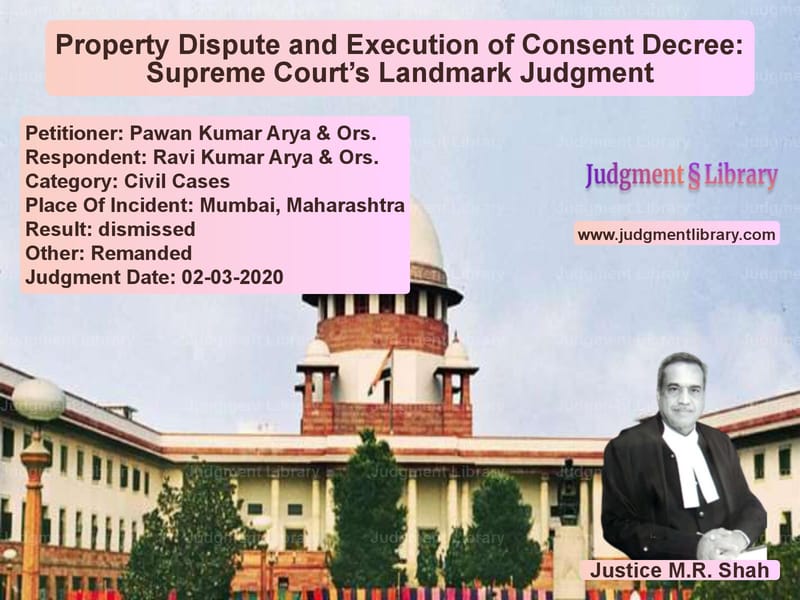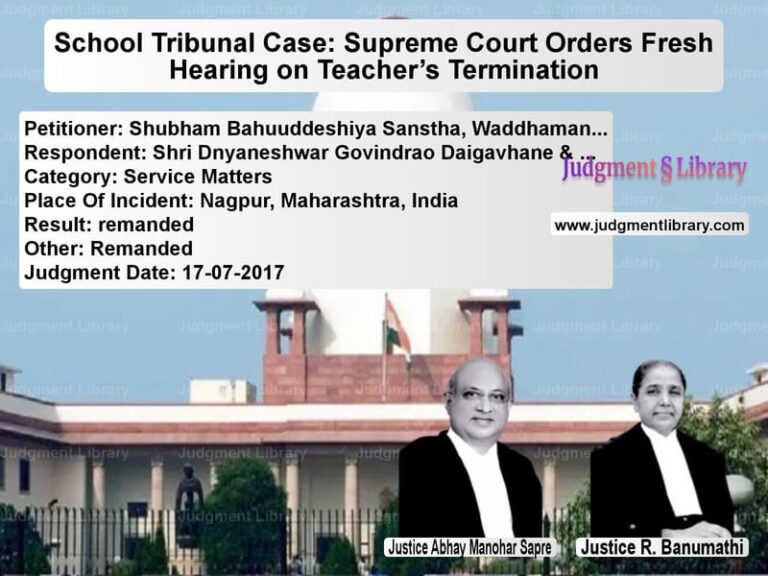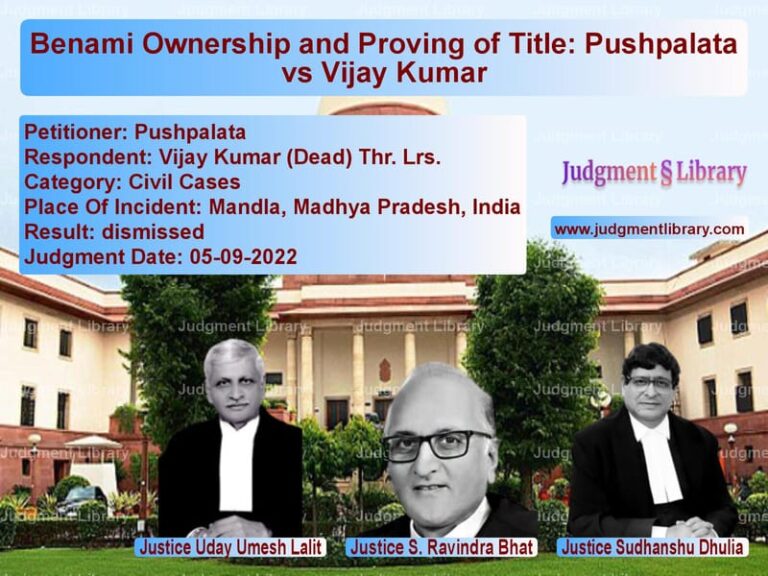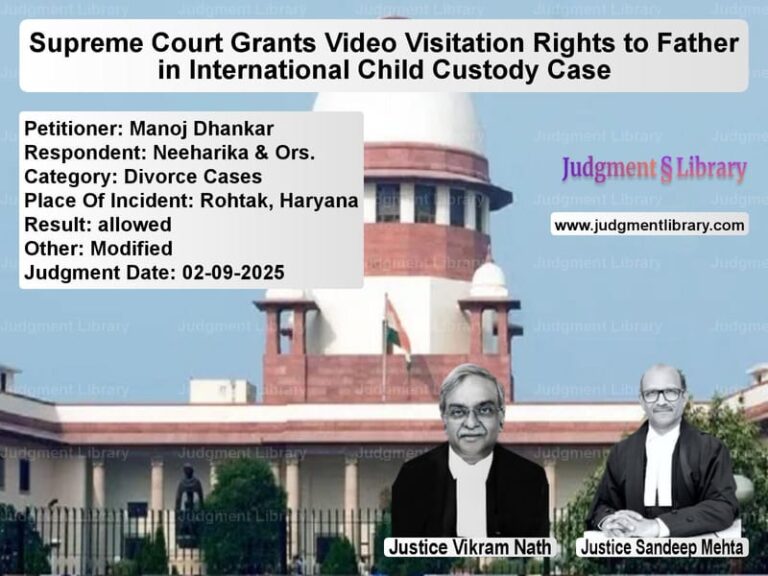Property Dispute and Execution of Consent Decree: Supreme Court’s Landmark Judgment
The case before the Supreme Court in Pawan Kumar Arya & Ors. v. Ravi Kumar Arya & Ors. revolved around the execution of a consent decree in a property dispute between two family groups—PA Group and RA Group. The case was particularly significant as it dealt with the interpretation of consent terms and whether the parties were bound to execute further agreements before enforcing specific clauses of the decree.
Background of the Case
The dispute centered around a property owned by Kash Foods Private Limited, situated at Worli, Mumbai, which was jointly held by both groups. A settlement was reached in 2015, leading to the execution of a consent decree. However, complications arose when the RA Group allegedly failed to comply with specific terms of the settlement, particularly concerning the allotment of flats to the PA Group.
The PA Group contended that under the consent decree, they were entitled to receive eight flats in the redeveloped property, while the RA Group was allocated seven flats. Despite the settlement, the RA Group refused to counter-sign the allotment letters, citing the need for further supplemental consent terms.
Petitioner’s Arguments
The appellants (PA Group) raised the following arguments:
- “The RA Group is unjustifiably withholding consent for executing the letter of allotment, thereby nullifying the benefits granted under the consent decree.”
- “The consent decree is a binding legal agreement that must be executed in its entirety, and the RA Group cannot selectively enforce certain provisions while disregarding others.”
- “The respondents have already enjoyed financial benefits from the agreement by mortgaging their allotted properties, whereas the PA Group has been deprived of its rightful share.”
- “The courts below have misinterpreted the consent decree by requiring supplemental consent terms, which were not a condition precedent for executing the allotment letters.”
Respondent’s Arguments
The RA Group, defending their position, argued:
- “The execution of the letter of allotment is contingent upon the finalization of supplemental consent terms, which the PA Group has not facilitated.”
- “The consent decree was intended as a framework agreement that required further documentation and agreements to be fully operational.”
- “The petitioners cannot selectively enforce parts of the consent decree without fulfilling their own obligations under the agreement.”
- “The courts were correct in dismissing the execution petition as premature since the necessary supplementary terms had not been agreed upon.”
Supreme Court’s Observations
The Supreme Court provided a detailed analysis of the consent terms and the obligations of both parties. The Court observed:
“One party cannot be permitted to say that that portion of the settlement which is in their favor be executed and/or complied with while disregarding other integral terms of the settlement.”
On the issue of requiring further agreements before executing the allotment letters, the Court held:
“The execution of the supplementary consent terms was integral to the overall settlement framework, and partial execution of the decree cannot be allowed without full compliance by both parties.”
Final Judgment
The Supreme Court ruled in favor of the respondents, holding that the execution petition was premature. However, the Court directed the RA Group to counter-sign the allotment letters within two weeks while restraining the PA Group from alienating or transferring the flats until the supplemental consent terms were finalized.
Key Takeaways
- Consent decrees must be enforced in their entirety, and partial execution cannot be permitted.
- Where further agreements are required for full implementation, courts may refuse to enforce isolated provisions of a consent decree.
- Judicial orders must balance the interests of both parties and ensure that agreements are honored in good faith.
- The ruling strengthens the principle that consent decrees should be treated as binding legal contracts that require complete adherence.
Conclusion
This judgment provides clarity on the execution of consent decrees in property disputes. The Supreme Court has reinforced that all parties must act in good faith to honor settlements and that courts will not permit selective enforcement of legal agreements. The decision ensures fairness in family settlements while preventing unjust enrichment by any party.
Petitioner Name: Pawan Kumar Arya & Ors..Respondent Name: Ravi Kumar Arya & Ors..Judgment By: Justice M.R. Shah.Place Of Incident: Mumbai, Maharashtra.Judgment Date: 02-03-2020.
Don’t miss out on the full details! Download the complete judgment in PDF format below and gain valuable insights instantly!
Download Judgment: Pawan Kumar Arya & O vs Ravi Kumar Arya & Or Supreme Court of India Judgment Dated 02-03-2020.pdf
Direct Downlaod Judgment: Direct downlaod this Judgment
See all petitions in Property Disputes
See all petitions in Specific Performance
See all petitions in Contract Disputes
See all petitions in Judgment by Mukeshkumar Rasikbhai Shah
See all petitions in dismissed
See all petitions in Remanded
See all petitions in supreme court of India judgments March 2020
See all petitions in 2020 judgments
See all posts in Civil Cases Category
See all allowed petitions in Civil Cases Category
See all Dismissed petitions in Civil Cases Category
See all partially allowed petitions in Civil Cases Category







